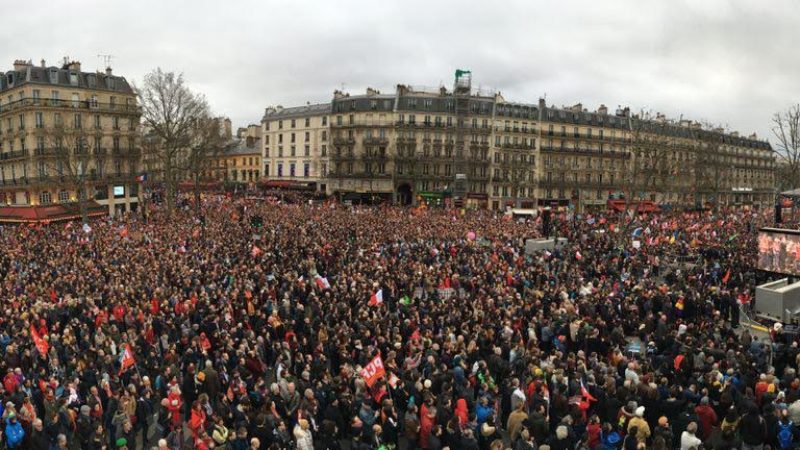

After the first round of the presidential election, what’s next for Jean-Luc Mélenchon’s France insoumise movement?
Last month Emmanuel Macron, a neo-liberal who won 23.8 per cent of the vote, and Marine Le Pen, far-right with 21.4 per cent, qualified for the second round of the French presidential election, to be held today. Results included a lower score than expected for the National Front and the elimination of the traditional parties – the Socialist Party with a historic low of 6.3 per cent and the traditional right with 19.9 per cent.
Anti-austerity and pro-ecology candidate Jean-Luc Mélenchon came fourth with 19.6 per cent. While the result was disappointing, it was extraordinary compared to Mélenchon’s 11 per cent in 2012. He came first in 3,465 villages and towns including Lille, Montpellier, Toulouse and Marseille.
It begs the question: why didn’t Hamon, the Socialist Party’s candidate who was clearly going nowhere, withdraw from the race and urge his supporters to vote for Mélenchon?
Alexis Corbière, a France insoumise spokesperson, said he discussed this with people in Hamon’s circle and was told it was not possible to withdraw “considering the money already invested”. In France, the state refunds electoral expenses to candidates who get at least five per cent.
Commenting on the candidates who qualified for the second round, Mélenchon said: “Both will keep supporting the established institutions, both have no awareness of ecology, and both intend to attack this country’s most basic social rights and entitlements”.
Many political forces – from the Communist Party to the traditional right – have called on people to vote Macron in order to defeat Le Pen but Mélenchon said: “I have no mandate from my 450,000 supporters as to what to do for the second round”. Supporters of his movement France insoumise (Unbowed France) were invited to express their views on the FI website; voting for Le Pen was not an option. The results: 36 per cent for a blank ballot, 35 per cent for Macron and 29 per cent for abstention.
For Mélenchon, the real challenge is the election of the 577 members of parliament on 11 and 18 June. What came out of the presidential elections “will not provide this country any stability”, he said. Since “both finalists together got barely 45 per cent of the vote and 10 million people abstained, the real judgement on the direction of this country, will be the parliamentary election. I want to transform the power that has gathered around me into a majority in parliament”. A national conference of the movement will launch this electoral campaign on May 13.
Meanwhile, a major event took place in the French overseas department of Guyane. Two days before the April 23 velection the collective Pou Lagwiyan Dekole (Guyane must take off!) won a massive victory for its population. After one month of general strike and road blockades, the French government agreed to invest three billion euros to meet people’s demands against austerity and cuts and the rebuilding of infrastructure. The chief executive of Arianespace, a satellite-launch company established in Guyane, said the protests had cost them 500,000 euros a day.
Only 34 per cent of the Guyanese electorate participated in the election, compared to 78 per cent in mainland France, and most of those who voted supported Mélenchon. Their success is a victory for the movement Mélenchon has been spearheading – a sign that people are determined to win change and will not stop at the election.
The media preference for Le Pen over Mélenchon was disturbing though not surprising. They can accommodate fascism but are terrified of any popular redistribution of wealth and power. This is what the grassroots is up against when we organise to win anything.
Meanwhile, almost 100,000 new supporters have joined France insoumise since April 23. This is a story that will continue…
Benoit Martin is active in Payday men’s network working with the Global Women’s Strike.



More from LabourList
Sarwar: ‘Humza Yousaf’s leadership is in tailspin. The time for change has come’
Haigh: We won’t shut ticket offices or cut jobs – or nationalise water
Lou Haigh to reveal ‘roadmap’ for public ownership of railways within first term